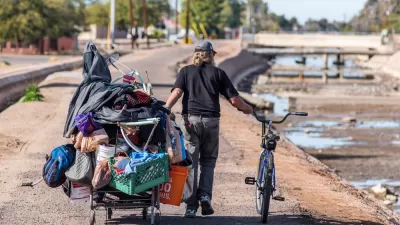A groundbreaking study provides some of the strongest evidence yet of the powerful results of permanent supportive housing for the chronically homeless.

Marisa Kendall shares news on a new study by researchers at the University of California, San Francisco (UCSF) that reveals big successes for Project Welcome Home in housing chronically homeless residents of Santa Clara County.
"The first-of-its-kind study found 86% of participants received housing and then stayed housed throughout nearly the entire duration of the study," reports Kendall.
The UCSF research team says that these findings are groundbreaking "because they show that permanent supportive housing — which provides subsidized housing paired with counseling, mental health, addiction and other services — is helping the county’s most difficult cases," according to Kendall.
Project Welcome Home is a $19 million project that used a lottery system between 2015 and 2019 to provide housing for the chronically homeless. The participants in the program were offered counseling, addiction treatment, and other help from the nonprofit Abode Services.
The results of the study do come with the caveat that supportive housing, while effective in this program, is not a silver bullet. "Seventy of the 443 participants died during the course of the study, including 19% of those who received housing," according to Kendall, who also lists other caveats.
The source article includes a lot more details on Project Welcome Home, the study's methodologies and findings, and the implications of the study for homeless policies in the Bay Area and state of California.
FULL STORY: ‘It works.’ Groundbreaking data proves success of Santa Clara County homeless housing program

Planetizen Federal Action Tracker
A weekly monitor of how Trump’s orders and actions are impacting planners and planning in America.

Restaurant Patios Were a Pandemic Win — Why Were They so Hard to Keep?
Social distancing requirements and changes in travel patterns prompted cities to pilot new uses for street and sidewalk space. Then it got complicated.

Map: Where Senate Republicans Want to Sell Your Public Lands
For public land advocates, the Senate Republicans’ proposal to sell millions of acres of public land in the West is “the biggest fight of their careers.”

Maui's Vacation Rental Debate Turns Ugly
Verbal attacks, misinformation campaigns and fistfights plague a high-stakes debate to convert thousands of vacation rentals into long-term housing.

San Francisco Suspends Traffic Calming Amidst Record Deaths
Citing “a challenging fiscal landscape,” the city will cease the program on the heels of 42 traffic deaths, including 24 pedestrians.

California Homeless Arrests, Citations Spike After Ruling
An investigation reveals that anti-homeless actions increased up to 500% after Grants Pass v. Johnson — even in cities claiming no policy change.
Urban Design for Planners 1: Software Tools
This six-course series explores essential urban design concepts using open source software and equips planners with the tools they need to participate fully in the urban design process.
Planning for Universal Design
Learn the tools for implementing Universal Design in planning regulations.
Heyer Gruel & Associates PA
JM Goldson LLC
Custer County Colorado
City of Camden Redevelopment Agency
City of Astoria
Transportation Research & Education Center (TREC) at Portland State University
Camden Redevelopment Agency
City of Claremont
Municipality of Princeton (NJ)





























